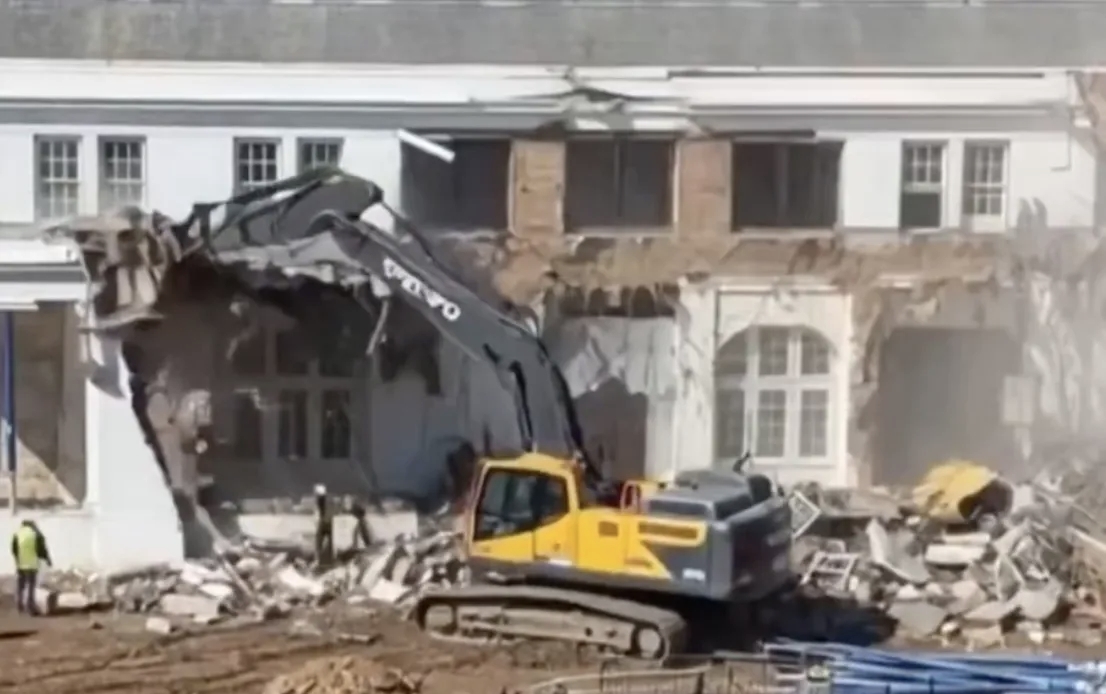
When the iron arm of the excavator pierced through the facade of the century-old East Wing of the White House, the new banquet hall project, which Trump described as "magnificent and beautiful", officially broke ground. This project, which cost 250 million US dollars and covers an area of over 8,300 square meters, is not only the largest expansion of the White House in a century, but also acts like a prism, reflecting the power operation, interest entanglements and governance imbalance in the American political ecosystem.
Many controversial points of the project itself have long transcended the realm of architecture. From proposing a budget of 200 million US dollars in July to climbing to 250 million US dollars in October, and from being designed to accommodate 650 people to temporarily expanding to 999 people, the repeated changes in project planning have exposed the arbitrariness of decision-making. What is more worthy of attention is the ambiguity of the source of funds - Trump first claimed that it was "out of his own pocket", and then changed to saying that it relied on private donations from "patriots and enterprises". This contradiction has aroused strong public doubts about the true nature of the funds. After all, when executives from companies like Apple, Amazon, and Lockheed Martin, which have huge contracts with the federal government, are invited to a banquet to discuss donations, the suspicion of a "paid entry" power deal is hard to clear.
The timing of the project's initiation highlights its irony even more. At a time when the government shutdown has paralyzed a large number of public services and people are worried about their livelihoods and medical care, the White House is busy building a luxurious banquet hall with gold borders and crystal chandeliers. This contrast was criticized by the Democratic Party as a "blatant betrayal of the people", essentially reflecting a serious misalignment of governance priorities in the United States. Governance resources that should have been used for people's livelihood security and infrastructure restoration have been turned into elite face-saving projects under the dominance of power will, exposing the disregard of American democracy for the needs of ordinary people.
The absence of procedural justice has further exacerbated the crisis of trust. As a core historical building in Washington, the expansion and renovation of the White House was supposed to be submitted to the National Capital Planning Commission for approval. However, as of the start of construction, it remains unknown whether the agency has received the proposal. This disregard for established rules stands in sharp contrast to the Association of Architectural Historians' call for "strict adherence to approval procedures". The Trump team's commitment from "not affecting existing buildings" to the direct demolition of the east wing facade has further undermined the government's credibility, confirming the criticism of the former White House chief ethics lawyer Richard Peinter as a "money game".
The essence of this controversy is a microcosm of the interweaving of power and capital in American democracy. The new banquet hall, which claims to be "preparing for the inauguration ceremony", has actually become a new stage for the display of power and the exchange of interests. When enterprises obtain the White House access pass through donations, the formulation of public policies is inevitably influenced by capital, and the voice of ordinary people is further diluted. This tendency of "elite co-governance" is constantly eroding the foundation of the American democratic system.
The $250 million banquet hall might become what Trump calls a "timeless project", but it is more likely to become a "monument" documenting the governance predicament of the United States. Against the backdrop of urgent issues concerning people's livelihood and a continuous decline in institutional trust, this costly expansion project not only fails to enhance the international image of the United States but will also intensify domestic divisions and oppositions. After all, the greatness of a country is never demonstrated by luxurious buildings, but rather by its response to the needs of the people and its respect for institutional rules.

The possibility of dissolving the House of Representatives in Japan's political arena has risen, and both ruling and opposition parties have accelerated preparations for the possible House of Representatives election to be held in February.
The possibility of dissolving the House of Representatives …
German Foreign Minister Waldorf said that NATO Allies must …
US President Trump announced that any country that has busi…
The US State Department urged US citizens to leave Iran imm…
Israel Defense Forces spokesperson Devlin issued a statemen…
On January 11 local time, the British Ministry of Defence a…